 “The Great Moon Hoax” was a series of six New York Sun articles discussing the supposed discovery of life on the Moon. The discovery—allegedly made using a massive telescope—was falsely attributed to famed astronomer Sir John Herschel. In the articles, the author claims that unicorns, bipedal beavers, bat-like humanoids, and other fantastic animals inhabit a forest- and ocean-covered Moon. The series was likely intended to boost the paper’s sales and ridicule what contemporary theories? Discuss
“The Great Moon Hoax” was a series of six New York Sun articles discussing the supposed discovery of life on the Moon. The discovery—allegedly made using a massive telescope—was falsely attributed to famed astronomer Sir John Herschel. In the articles, the author claims that unicorns, bipedal beavers, bat-like humanoids, and other fantastic animals inhabit a forest- and ocean-covered Moon. The series was likely intended to boost the paper’s sales and ridicule what contemporary theories? Discuss
Source: The Free Dictionary
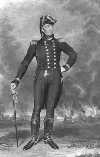 During the War of 1812, a year after US troops burned Canadian Parliament Buildings in the Battle of York, British troops retaliated by marching on Washington, DC, and setting fire to its public buildings—including the Capitol and the White House. According to some accounts, First Lady Dolley Madison refused to leave the White House until just moments before British troops arrived, gathering valuables, documents, and other items of importance, including what notable painting?
During the War of 1812, a year after US troops burned Canadian Parliament Buildings in the Battle of York, British troops retaliated by marching on Washington, DC, and setting fire to its public buildings—including the Capitol and the White House. According to some accounts, First Lady Dolley Madison refused to leave the White House until just moments before British troops arrived, gathering valuables, documents, and other items of importance, including what notable painting? 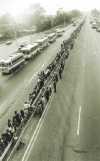 In 1989, more than a million people formed a human chain more than 373 miles (600 km) long across the three Baltic states—Estonia, Latvia, and Lithuania. Known as the “Baltic Way,” the demonstration marked the 50th anniversary of the Molotov-Ribbentrop Pact, an agreement between the Soviet Union and Germany that secretly divided Poland and gave the Soviet Union control of Latvia, Lithuania, Estonia, and Finland. When did the Soviet Union finally admit the existence of the secret protocol?
In 1989, more than a million people formed a human chain more than 373 miles (600 km) long across the three Baltic states—Estonia, Latvia, and Lithuania. Known as the “Baltic Way,” the demonstration marked the 50th anniversary of the Molotov-Ribbentrop Pact, an agreement between the Soviet Union and Germany that secretly divided Poland and gave the Soviet Union control of Latvia, Lithuania, Estonia, and Finland. When did the Soviet Union finally admit the existence of the secret protocol? 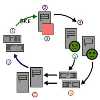 A botnet is a collection of software robots, or bots, that run automatically on groups of “zombie” computers controlled remotely by hackers. One of the most notorious botnets in hacking history, the so-called “Storm” botnet was named for the storm-related subject lines initially employed by its infectious emails. Of the billions of virus messages sent out by this botnet, 57 million were sent in one day alone. By September 2007, the botnet is believed to have been running on how many computers?
A botnet is a collection of software robots, or bots, that run automatically on groups of “zombie” computers controlled remotely by hackers. One of the most notorious botnets in hacking history, the so-called “Storm” botnet was named for the storm-related subject lines initially employed by its infectious emails. Of the billions of virus messages sent out by this botnet, 57 million were sent in one day alone. By September 2007, the botnet is believed to have been running on how many computers?  Turner, born into slavery and sold three times as a child, led a slave uprising in Virginia that resulted in the deaths of about 55 white people. A deeply religious man, he experienced visions he interpreted as divine in nature and which convinced him that his mission in life was to lead slaves out of bondage. He and many of his followers were caught and hanged, and many more blacks were killed in retaliation. What celestial event did Turner interpret as a sign to begin preparing for rebellion?
Turner, born into slavery and sold three times as a child, led a slave uprising in Virginia that resulted in the deaths of about 55 white people. A deeply religious man, he experienced visions he interpreted as divine in nature and which convinced him that his mission in life was to lead slaves out of bondage. He and many of his followers were caught and hanged, and many more blacks were killed in retaliation. What celestial event did Turner interpret as a sign to begin preparing for rebellion? 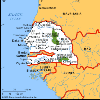 First colonized by the Portuguese, Senegal became part of French West Africa in 1895. In 1946, it became an overseas territory of France, and its inhabitants were made French citizens. In 1958, Senegal became an autonomous republic within the French Community. The next year, Senegal joined the Mali Federation, which became independent in June 1960. Two months later, Senegal withdrew from the federation, becoming an independent state. What small nation does Senegal almost entirely surround?
First colonized by the Portuguese, Senegal became part of French West Africa in 1895. In 1946, it became an overseas territory of France, and its inhabitants were made French citizens. In 1958, Senegal became an autonomous republic within the French Community. The next year, Senegal joined the Mali Federation, which became independent in June 1960. Two months later, Senegal withdrew from the federation, becoming an independent state. What small nation does Senegal almost entirely surround?  The USS Constitution, better known as “Old Ironsides,” is perhaps the most famous vessel in the history of the US Navy. One of the first frigates built for the Navy, the Constitution saw action in several wars and defeated the British frigate HMS Guerrière during the War of 1812. Later condemned as unseaworthy, the ship was saved from dismantling by public sentiment aroused by Oliver Wendell Holmes’ poem “Old Ironsides.” How did the wooden ship get its nickname?
The USS Constitution, better known as “Old Ironsides,” is perhaps the most famous vessel in the history of the US Navy. One of the first frigates built for the Navy, the Constitution saw action in several wars and defeated the British frigate HMS Guerrière during the War of 1812. Later condemned as unseaworthy, the ship was saved from dismantling by public sentiment aroused by Oliver Wendell Holmes’ poem “Old Ironsides.” How did the wooden ship get its nickname? 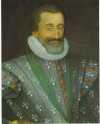 The marriage of Henry of Navarre—later King Henry IV of France—to Marguerite de Valois—daughter of Henry II and Catherine de’ Medici—was intended to forge peace between Roman Catholics and Protestants. However, the occasion was instead used as a plot to massacre the Protestant Huguenots gathered for the wedding. The massacre spread from Paris throughout France, and an estimated 70,000 were killed, resulting in the resumption of civil war. How did Henry narrowly escape death amid the killings?
The marriage of Henry of Navarre—later King Henry IV of France—to Marguerite de Valois—daughter of Henry II and Catherine de’ Medici—was intended to forge peace between Roman Catholics and Protestants. However, the occasion was instead used as a plot to massacre the Protestant Huguenots gathered for the wedding. The massacre spread from Paris throughout France, and an estimated 70,000 were killed, resulting in the resumption of civil war. How did Henry narrowly escape death amid the killings? 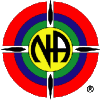 Modeled after Alcoholics Anonymous, Narcotics Anonymous (NA) is an organization dedicated to the treatment of drug addiction. Since its first meeting in 1953, NA has spread to more than 100 countries, with tens of thousands of meetings held regularly. Its 12-step program of recovery begins with the member’s admission that his or her life has become unmanageable due to powerlessness over addiction. What controversies have arisen over the group’s official literature?
Modeled after Alcoholics Anonymous, Narcotics Anonymous (NA) is an organization dedicated to the treatment of drug addiction. Since its first meeting in 1953, NA has spread to more than 100 countries, with tens of thousands of meetings held regularly. Its 12-step program of recovery begins with the member’s admission that his or her life has become unmanageable due to powerlessness over addiction. What controversies have arisen over the group’s official literature? 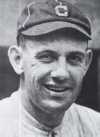 For the entirety of his Major League Baseball career, Ray Chapman was a shortstop for Cleveland. He set a team record for stolen bases that would stand for decades, but his career was tragically cut short when he was hit in the head by a pitch thrown by Yankees hurler Carl Mays. According to eyewitnesses, Chapman likely never even saw the ball. He is the only Major League Baseball player to have died as a result of an injury received in a game. His death led the league to establish what rule?
For the entirety of his Major League Baseball career, Ray Chapman was a shortstop for Cleveland. He set a team record for stolen bases that would stand for decades, but his career was tragically cut short when he was hit in the head by a pitch thrown by Yankees hurler Carl Mays. According to eyewitnesses, Chapman likely never even saw the ball. He is the only Major League Baseball player to have died as a result of an injury received in a game. His death led the league to establish what rule?